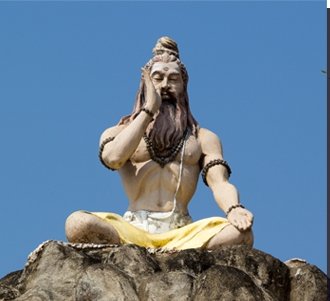For one steeped in Hindu culture, the word ‘yamaḥ’ conjures up a terrible picture of Lord Death, Yama, the controller of all beings. It also brings to mind the statement of Lord Kṛṣṇa, ‘Amongst all the factors that control, self-control (yamaḥ) is the glory of the Lord.’ Now let us see yamaḥ as a value to be followed, as an aspect of Aśṭānga-yoga and as a practice of meditation according to Vedānta.

सर्वं ब्रह्मेति विज्ञानादिन्द्रियग्रामसंयमः यमोऽयमिति॔ ॥ संप्रोक्तोऽभ्यसनीयो मुहुर्मुहुः ॥ १०४ ॥
sarvam brahmeti vijñānād-indriyagrāma-samyamaḥ, yamo’yamiti samprokto ‘bhyasaniyo muhurmuhuh.(104)
सर्वम् all; ब्रह्म Truth; (अस्ति – is) ; इति विज्ञानात् from such knowledge; इन्द्रियग्रामसंयमः the restraint of all the senses; यम इति – as yama ; अयम this ; संर्पोक्तः is rightly called; सः (this); अभ्यसनीय: shoul practised; मुहुर्मुहु-repeatedly
The restraint of all the senses by means of such knowledge as ‘All this is Truth is rightly called yamah, which should be practised again and again.
‘The Creator has made our sense organs extrovert and they therefore see without and not within.’ 2 Unrestrained, these senses can lead to disaster for oneself and others, like a chariot pulled by uncontrolled horses. For example, abusive language hurts others and creates negative feelings within; uncontrolled desire for the property or possessions of others leads to disastrous consequences for all concerned.
As mentioned earlier, each of these steps emphasises one aspect of our life or personality. I, the individual, am part of a family, society, nation and mankind. I should therefore live in harmony with all. Following the value of yamaḥ, control of the senses, makes us sensitive and purifies our transactions with others (vyavahāra śuddhi) and ensures harmony in the world. Damaḥ or yamaḥ, the control of the senses, is referred to as one of the six-fold wealth (ṣaḍ sampatti) of a human being. A well brought up child will not use bad words or abusive language even when provoked. The discipline becomes internalised and effortless.
The five sub-aspects of yamaḥ are – ahimsā (non-injury), satya (truthfulness), asteya (non-stealing), brahmacarya (continence), and aparigraha (non-hoarding). – Yogasūtra 2.30
Ahimsā – Non-Violence
Human beings often hurt others when they are themselves hurt, sometimes in revenge, or because of selfishness, in a bid to subdue others, or simply because of sadistic tendencies, sometimes due to inadvertence, or even unknowingly. People hurt others physically, verbally or mentally. Some serve the poor with great love, but do not mind pelting animals for their fur. Some are very kind to their pets, but eat the flesh of a cow or pig without compunction. Some are vegetarians on certain days. Some hurt through cruel words or negative thoughts. ‘Not harming any being, at any time by one’s body, speech or mind is called ahiṁsā.’ ‘In the presence of one well established in this great virtue, all thoughts of violence or revenge disappear.’ 4 Wild animals are known to have lived peacefully near great sages. Lions and tigers followed the saint Chaitanya Mahāprabhu as he danced through the forest singing the name of the Lord. Aṅgulimāla gave up his violent ways, when he came in contact with Lord Buddha.

Satya – Truthfulness
We speak untruth prompted by desire, selfishness, greed or attachment, to appear better in the eyes of others, or out of sheer habit. Truthfulness is to be honest in your thoughts (intellectual honesty – ṛtam), words (satyam) and actions (straightforwardness – ārjavam). To be honest is to speak as is seen (yathā dṛṣṭam), known (anumitam) or heard (śrutam), without exaggeration or omission. However, our words should be appropriate (mitam), pleasant (priyam) and beneficial to others (hitam). We should not delude, cheat or confuse others with our words. We should keep our promises (satya vrata). ‘When one is established in this divine virtue, even a mere wish becomes true (satya-saṅkalpa).’ 5 Yudhiṣṭhira’s and Hariścandra’s commitment to truth have become legendary. It is Gandhiji’s observance of satya and ahiṁsā that made him a true Mahātmā – a great soul.

Asteya – Non-stealing
Man steals out of desire, greed, selfishness, lust, possessiveness and sometimes out of habit or addiction (kleptomania). Some copy ideas or words without acknowledgement, some cheat on taxes, some steal others’ achievements and glory, while some mentally arrogate another’s wealth or wife. ‘Asteya is not just physical non-stealing, but refusal to covet another’s wealth or possession, verbally or mentally.’ 6 One who is content with what he has will not steal that which belongs to others. ‘All the hidden wealth of the world gets revealed to one well established in the virtue of asteya.’ 7 Some are known to have special powers (siddhis) to recognise underground sources of water (water diviners are well known in India), oil and so on. But when we do not covet another’s wealth, all wealth becomes revealed and available to us. When Bharata came with hundreds to the simple hermitage of Sage Bharadvāja, they were treated with royal comfort made available immediately by the yogic power of the sage!

Brahmacharya – Continence
To some, sexual restraint seems impractical, impossible or insane. However, over-indulgence and inappropriate sexual relation, as we all know, have been the cause of untold sorrow to man. For a householder, an appropriate relation with one’s own spouse is brahmacarya, and for a renunciate, it is total abstinence from all sexual contact. The scriptures describe eight-fold brahmacarya – avoiding remembrance, speaking, touching, playing, seeing, talking in solitude, mental-revelling, all the aforesaid with a sexual connotation, and also intercourse with the opposite sex. ‘One established in such continence gains immense power and brilliance.’ 8 The might and greatness of Bhīṣma, who took the vow of brahmacarya is a famous instance in this context. The Lord Himself had to save the skilled Arjuna, who was about to be vanquished by Bhīṣma.

Aparigraha – Non-hoarding
Insecurity, possessiveness, selfishness, greed, desire, pride and so on, make a person collect and hoard more than he needs. Faith, dispassion and a value for a simple lifestyle will prevent one from collecting and hoarding unnecessarily. Also, when one thinks of the time, effort and pain involved in acquiring, protecting and enjoying things, and the problems of getting attached, fear of loss, pangs of separation and so on, one automatically avoids collecting them (asvīkaraṇam). Many rich people spend all their time maintaining their treasured collections of antique jewellery, coins, and so on and spend a fortune in security systems to safeguard them. Life is too precious to be wasted away in collecting and maintaining things we have to leave one day anyway! ‘To one established in aparigraha, all previous lives become known.’ 9 Buddha knew about his hundred previous lives, which are described in the Jātaka tales. When we do not hold on to (hoard) any thoughts, knowledge or possessions, all becomes known to us! It is our ignorance that makes us think that the world is different from us, that it is real and joy-giving. No wonder we run after objects and beings in search of happiness, get hurt, seek revenge, wish to possess, fear their loss and so on. With the Knowledge that ‘All is the infinite Self alone’, the senses are automatically restrained and virtues like non-injury and truthfulness become natural. To maintain this thought again and again, till it becomes natural and spontaneous, is the meditation called yamaḥ, recommended in this verse.Worldly knowledge can make us proud, agitate our mind and disturb our senses. Spiritual knowledge quietens the mind and the senses.


Your article helped me a lot, is there any more related content? Thanks!
Your post on Yamaḥ is like a transformative journey into the depths of self-discipline. ‘Yamaḥ’ resonates with my interest in yogic philosophy, and your insights enhance the beauty of embracing ethical principles. Thank you for this insightful and enlightening share!
Yamaḥ takes you places others only dream of.